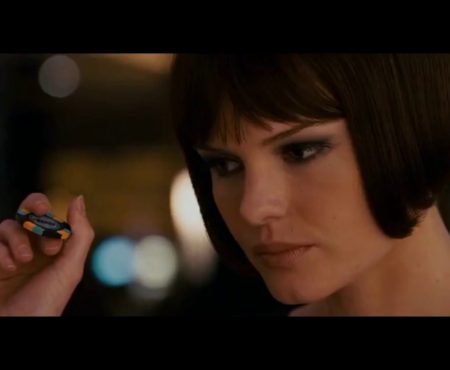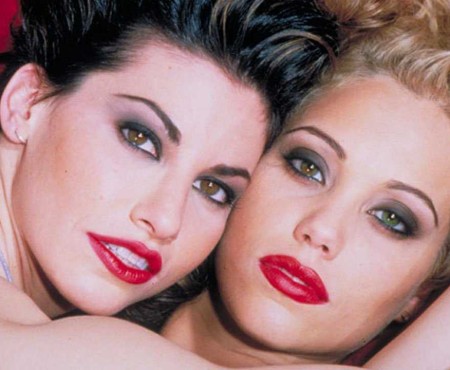Mulligan: Apparently Smith tired of the protesters even more quickly than you did, because his next three films seem custom-designed to not attract the attention of anyone other than converted fans.
His follow-up to Dogma was 2001’s Jay and Silent Bob Strike Back. “The key word here,” as that famous line from Annie Hall goes, “is indulgent.” Jay and Silent Bob is nothing more than Kevin Smith congratulating himself for having survived eight years in the business and having made four movies. We start with nods to Clerks, Mallrats, Amy, and Dogma, and continue down the path of throwback jokes and cameos for an endless 105 minutes. There’s also a slow-motion pan up a bent-over Shannon Elizabeth’s ass, and plenty of jokes about people not knowing what the Internet is, because it was 2001. (There is one lone bright spot: Chris Rock as a sell-out black militant filmmaker, spouting off complaints like “$70 million and I can’t even get a black grip.”) If Smith was a savvy capitalist, we’d read this as a commercial for his other work—but in truth, it probably served him more as an act comparable to masturbation. And visually speaking, it’s as unappealing as “Kevin Smith jerks himself off” sounds.
After Jay and Bob, Smith swore off the “universe” he had established with his first five films, and made the halfway-family-friendly melodrama Jersey Girl. That failed in a major way, so he sprinted right back to the well, and we ended up with Clerks II. These are the films where Smith’s visual shakiness devolved into incompetence, and his hand with actors faltered completely. In theory, there’s still some ambition throughout this cycle: A death-drenched junior-woman’s picture and a sequel to a decade-old microbudget indie are not commercial slam dunks. But, ambition be damned, that potential we discussed seems to be long gone. What the hell happened?
Burns: Well, if you want my armchair psychoanalysis, I’ve always felt like the Internet kinda broke this guy. Long before Twitter tore down conventional communication barriers between artists and their fans, Smith was already all over message boards and popping up in fanboy website comment sections—I don’t think there’s ever been a filmmaker of his stature so relentlessly available; constantly responding to whatever people might be saying about him, anywhere online. (I’m sure he’s probably reading this right now. Hi Kevin.) When I interviewed Smith back in 2006, he came off as unhealthily obsessed with the opinions of folks who, in the grand scheme of things, only actually amount to a very tiny percentage of moviegoers.
I’ve no doubt that Smith’s unprecedented accessibility was invaluable in cultivating the most devoted audience of fans I’ve seen outside of pop boy bands and religious cults. By this time in his career, Smith was not just a filmmaker; he’d become an industry unto himself, a marketing machine of collectible figures, comic books, and massively selling DVDs that featured nothing but him talking…for four hours straight. (The guy even published his fucking blog in book form, for Chrissakes.) This kind of echo chamber is how you end up with something like Jay and Silent Bob Strike Back, about as stagnant and dispiriting a moviegoing experience as I can recall. Being nothing but inside jokes and fan-service, the self-congratulation was toxic. I sat there in horror, watching an artist I’d admired disappear up his own asshole.
And as you point out, the filmmaking just unaccountably devolved—Smith’s learning curve went backwards. Jersey Girl wasn’t so much painful as just sad, striving for middlebrow mediocrity and falling short of even that. A legendary cinematographer like Vilmos Zsigmond couldn’t make it look more than half-decent. (Still gobsmacked that the pivotal moment during which Ben Affleck rediscovers his love for negotiation or whatever was related entirely via voice-over, as if nobody wanted to even bother figuring out how to make that scene play.)
For as much as we’ve gushed already in this piece about the grubby authenticity of Clerks, the sequel felt desperate, phony and pathetically out of touch. I don’t know if you’ve ever had the pleasure of working in fast food, but it’s extremely laborious and fast-paced drudgery: Whereas these guys fart around surfing the ‘net all day and Smith’s idea of a lunchtime “rush” was maybe two or three people in line. Clerks II’s fundamental cluelessness called to mind so many novelists, who, after early triumphs, spend the rest of their careers writing only about tenured English professors and the publishing industry—cut off, thanks to their celebrity, from the regular lives they once chronicled so vividly.
Though I haven’t seen it again since the day it opened, I do fondly remember being quite charmed by 2008’s Zack and Miri Make a Porno. Granted, Smith remained comfortably inside that bubble I’ve been talking about here, but instead of tiresome self-references, he spun a cleverly disguised riff on his own experiences shooting Clerks, with a cast of endearing misfits filming that no-budget skin-flick of the title with a “hey, let’s put on a show” exuberance. Having pros like Seth Rogen and Elizabeth Banks in the leads offered a refreshing break from his over-familiar stock company, putting their own spins on Smith’s often same-sounding dialogue.
There was also a nice generational resonance at work, as Rogen’s potty-mouthed man-child persona and his blockbuster bromances owe an enormous debt to the digressive perversions of a certain New Jersey convenience store. Warmly received by critics (even me), Zack and Miri nonetheless tanked at the box office, which brings us to Cop Out and all the unpleasantness that followed.
Mulligan: You could probably give a much better overview of that “unpleasantness”—I presume you’re referring to Smith’s very public feud with the very concept of film criticism—but at least some of the bad energy is quite apparent in the text itself. I’ve watched a lot of Bruce Willis movies, and you have too. We’ve seen him in blockbusters, in crappy Stephen Frears movies, and in innumerable direct-to-video features co-starring 50 Cent. Through all that, I don’t think I’ve ever seen him sleepwalk through a movie the way he sleepwalks through Cop Out. He might not even know that Tracy Morgan was his co-star; his eyes never seem to wander from this half-conscious, straightforward gaze that he maintains throughout the whole thing. The word “performance” doesn’t even feel earned here; this is just a paid appearance, as canned and half-assed as your average book signing or Q-and-A.
Of course, the Cop Out problem extends beyond acting. You’re right that there’s some Smith-ian charm in Zack and Miri. You’re not going to find that in Cop Out—you’re not going to find anything in Cop Out. It’s the only Smith film to date that the man didn’t write himself, and it’s characterized by an aggressive ordinariness. Say what you will about Smith’s films, but none of them could’ve been made by anyone else (not even Jersey Girl, with its weird mix of insistent pathos and blue-tinted pornography humor). The only thing that marks Cop Out as a Smith film is the garish color scheme.
Burns: The one time I laughed during Cop Out was on opening night when a drunk kid in my row stood up and yelled: “FUCK YOU! BE FUNNIER!” You are correct that Willis’s performance is openly hostile, but to tell you the truth, after about a half-hour of this slovenly garbage, I was siding with him. To call this movie half-assed would be a severe overestimation of asses invested in the project. I was working projection at a theatre during Cop Out’s brief run and found myself obsessed with re-watching that final scene, when the camera just abruptly booms up into the air for a wide shot and the movie’s suddenly over—not even ending on a joke, just a shrug: “That’s all, folks.”
There’s a story Smith tells on one of those DVDs where he talks for four hours—I kid, he’s a funny motherfucker who can spin a yarn—but this particular tale sent me through the roof. He’s talking about day on Cop Out when he was explaining the setup of a shot to Willis, who quite reasonably asked his director which millimeter lens was on the camera, so he could modulate his performance accordingly. Smith had no idea what lens he was using, and Willis blew up on him in front of everybody on the set.
Of course it was all framed as yet another story about how Bruce Willis is a huge asshole (a topic Kevin Smith still brings up at the drop of a hat, and one that will probably come as an enormous surprise to anyone who has never, ever read a single thing about Bruce Willis going all the way back to Moonlighting in the 1980s), but in this case, I think the asshole was right. You are directing a $40 million picture for a major studio with a huge movie star—you’re captain of an enormous ship, in other words—and you don’t even know your lenses? This was Smith’s ninth feature film; at what point does the aw-shucks, I’m-just-like-you-guys, know-nothing persona just stink of laziness?
Smith took a spanking in the press for Cop Out, and he didn’t take it well. He lashed out at film critics in general, announced we were heretofore forever banned from advance screenings of his movies and carried on very much in the way one might expect from a successful millionaire so thin-skinned and defensive that he still stays up until three o’clock in the morning arguing with dudes calling themselves “Heywood Jablowme” on random websites.
It all felt horribly misguided and childish to me, particularly coming from a guy whose career was basically launched by Amy Taubin’s review of Clerks. Smith credited our good friend Matt Zoller Seitz’s thoughtful pan of Mallrats with giving him the courage to write Chasing Amy (he even reprinted Matt’s New York Press review in the published edition of his screenplay), but now we’re all suddenly a bunch of worthless freeloaders whose opinions should be discounted because…because we see movies for free?
I don’t know if you ever watched it, but Kevin Smith had his own “film criticism” show on Hulu for a little while that was seriously just him bringing a hundred or so of his Twitter followers to see the latest blockbuster every Friday night, and the rowdy crowd took turns shouting a line or two into the camera about what parts of the movie they thought were awesome and what they thought sucked. I used to hate-watch it every week just to make my blood boil. The show was such an open insult to our profession, to what we love—a calculated affront to what you and I do, and to the hours of thought and care that we have given right here in this conversation that might actually never end—and it was all pumped up with the kind of stunted fanboy anti-intellectualism in which you could see someone being proud of not knowing which lens they had on the camera.
I really started to despise Kevin Smith as a human being after watching that show. So I had to pay to see Red State for review? Big fucking deal, I pay to see Madea movies and crazy right-wing propaganda pictures that don’t screen for critics all the time. (And I don’t think Kevin Smith has any conception of folks like you and myself, who often go see movies during their regular engagements because we happen to be adults with jobs and responsibilities who can’t drop everything and rearrange our lives around last-minute notices of weekday afternoon press screenings.)
So because I paid to see Red State, does this validate my opinion that’s it’s an ugly, unpleasant movie built on a faulty premise (since when does the Westboro Baptist Church target heterosexuals?) with an ending that is, pardon the phrase, a cop out?
Mulligan: First off, you know well that you need neither I nor Kevin Smith to validate your opinion of John Goodman movies.
Past that, said faulty premise is hardly the first thing I’d latch onto regarding Red State. It, like Tusk after it, is a rambling stoner movie; a multi-hander that shifts gears, genres, and targets every 10 minutes because it’d rather do everything on Kevin Smith’s mind than focus on any one particular thread. We get a little bit of Michael Parks as Eli Roth’s Fred Phelps, a little bit of John Goodman as male Marge Gunderson, some shootouts, some chase scenes, some social commentary, some gore, some fashionable nihilism weighed out by some rather crass attempts at achieving a sort of “grace,” some verbal acrobatics. It feels, very consciously, like Smith trying to do his version of a Tarantino movie—right down to the big Michael Parks monologue. It goes without saying that he hardly lives up to his muse—but there’s madcap fun had in his reaching.
Speaking of that cop-out ending, though: A few guys talking in circles after the fact in a boardroom—it always reminded me of the ending of Burn After Reading. That’s how I feel right now: What have we learned here? Your appreciation of Zack and Miri, and mine of Smith’s last two films, seems to me to show that we can never leave this guy behind. But I’ll be damned if I know why that is, after dreck like Jay and Silent Bob Strike Back. For as much as I admire Smith’s ability to turn a filthy phrase, that alone can’t be what keeps us coming back. So, at the end of this conversation, I figure the best way to answer that question is to kick things back to you, with one question more. You’re going to see Tusk, as Smith intended, with a general audience, on your own dime. Why?
Burns: The ironic punchline to all of this is that Kevin Smith finally buried the hatchet and ended his War on Film Critics right around the time the Boston PR agency his people hired to represent Tusk in this backwater town decided that after 15 years I am no longer qualified to be a film critic anymore. So I’m writing this piece from a disadvantage as you have seen the new movie and I have not… but I assume once I see Tusk, we will continue this conversation over beers at our earliest convenience?
Meanwhile, I will indeed go happily pay to sit alongside the great unwashed on opening weekend, holding true to Smith’s demands from a couple years ago, and hoping yet again for that same magic I felt first watching Clerks on that amazing night at the Angelika back in 1994. I like to piss and moan a lot, but I’m not giving up on him, either.





















7 thoughts on “We Need To Talk About Kevin (Smith)”
Strike Back wasn’t THAT bad for God’s sake. Agreed on almost everything else.
Agreed. Granted, it’s probably been close to 7 years since I’ve last watched it, but I remember it holding up quite well. If not better, because I had the chance to watch it on a theater screen and I had a terrible head cold at the time. It felt like watching a live-action cartoon with a weird manic energy that I remember appreciating. Who knows how I’ll feel about now though. I have a feeling the first few films of his aren’t going to hold up that well anymore for me either.
Great piece, thanks for it.
I like the movies he makes where there is less “running around”. Dogma being the only exception. These last two are just off for some reason. I like parts of Red State and Tusk, but the sum of these parts don’t make me want to watch them ever again.
You must have seen a different Clerks II, because I think it’s the best thing Smith has done. It’s “detachment from reality” is no moreso than any of Smith’s movies. I also thought that Red State was brave different all the way through. Disappointing to see the conversation hasn’t really separated the lazy consensus and the hysterical fans from their equally mundane camps.
That line about the protesters hassling people who just got out of Being John Malkovich is great.
Thanks for the info about the lens. For the other part of the rant, tl/dr.